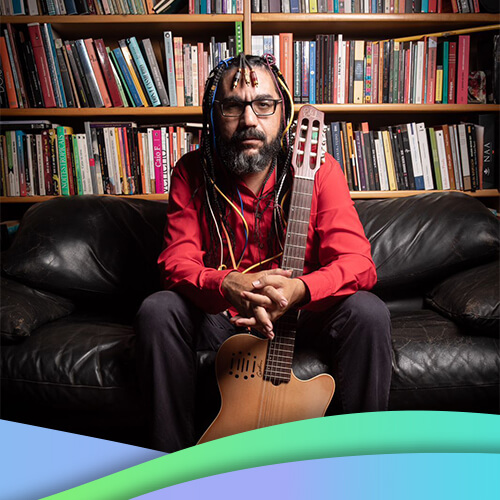Additional Information
Alberto Salgado has been evolving in the Brazilian musical world for a quarter of a century. But he has particularly asserted himself over the past decade, producing two solo albums (and soon a third), including Cabaça d’Agua which won the prize for best album at the Brazilian Music Awards in 2017.
He will perform at Nuits d’Afriques on July 11 at 8 p.m. at Balattou. Michel Labrecque interviewed him in his mother tongue, Portuguese, to better understand his approach.
Alberto Salgado grew up and lives in Brasilia, the capital of Brazil located in the agricultural plains in the middle of this immense country. He entered the musical universe through capoeira, this Brazilian martial art which combines art with combat. As a child, he learned the berimbau and percussion and the cavaquihno (small four-string guitar).
He then went through a rap period, then began to seriously learn classical and acoustic guitar. “By mixing all this I created my style and I realized that people appreciated it, which pushed me to make solo albums,” he explains from Vancouver in a video conference with his very broad smile.
In 2014, Além do Quintal appeared. “It was a catalog of my musical offering. Then, three years later, Cabaça d’Agua, “much better defined”, in the opinion of Alberto Salgado.
How does he describe his music? We both agree that the term MBP (Musica Popular Brasileira) is too generic.
“I would say that I make Brazilian percussive music,” he exclaims, laughing. It is true that even his guitar is percussive, sometimes reminiscent of early Lenin. “I have a lot of African influences, the rhythms are super important to me.” The fact remains that the guitar is the predominant instrument, we hear influences of forró, samba and ijexa, among others. There are so many different Brazilian genres.
“In Brazil, we counted three hundred and thirty-seven different rhythms. In the United States, there are around thirty. »
Added to this cocktail are more electronic and synthetic influences, quite discreet but which add contemporaryness. And of course, Alberto’s warm voice.
“It’s also warm music, it’s important to say that,” adds Salgado. “Many of my songs address social themes, including the absurd inequalities of my country, people who no one gives a voice to, but I also talk about joy and love. »
His third offering, Tutorial de Ebo, should be released in the coming months. The Balattou audience will be able to hear five new songs. “Ebo is one of the religions that comes from African rituals, just like Candomblé,” says Alberto. “This album will definitely be my most percussive and danceable record. »
Alberto Salgado will be surrounded by three musicians, “all virtuosos,” he says. We will be treated to a mixture of the three opuses. It should heat up, but subtly. This is his first trip to Canada. He can’t wait to discover Montreal.
From this interview, an authenticity of the character of Alberto Salgado emerges. To be continued at Balattou.
























